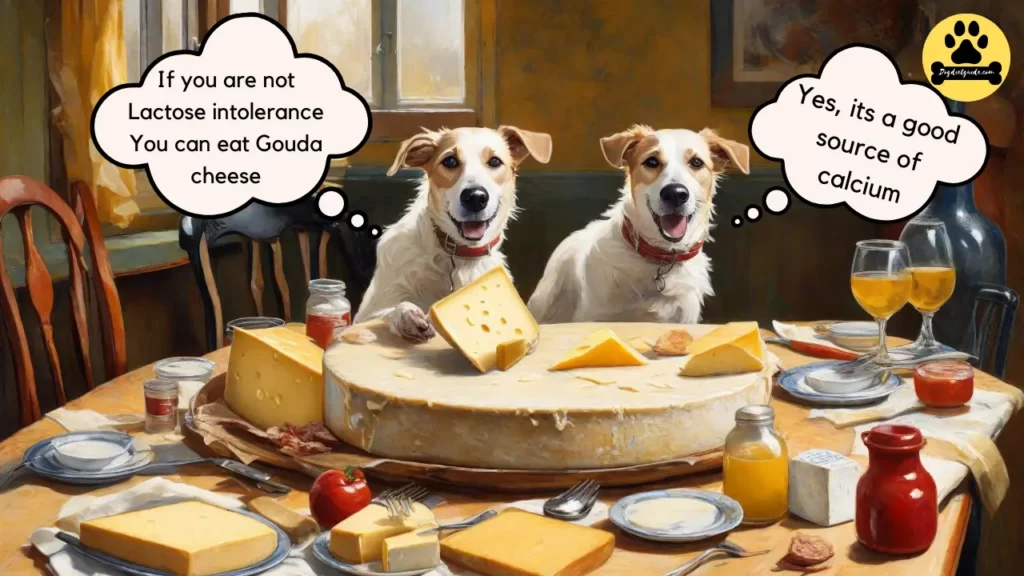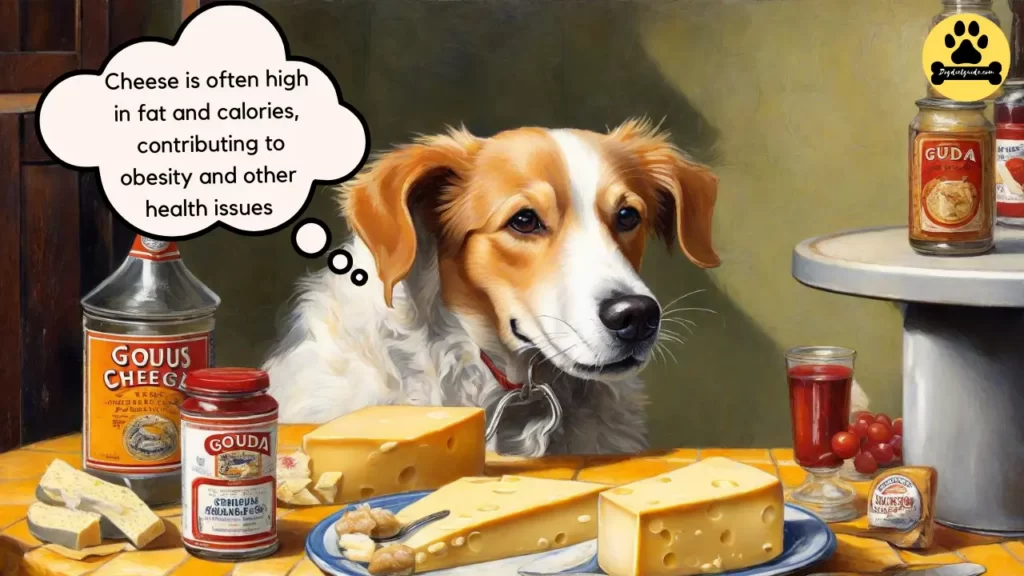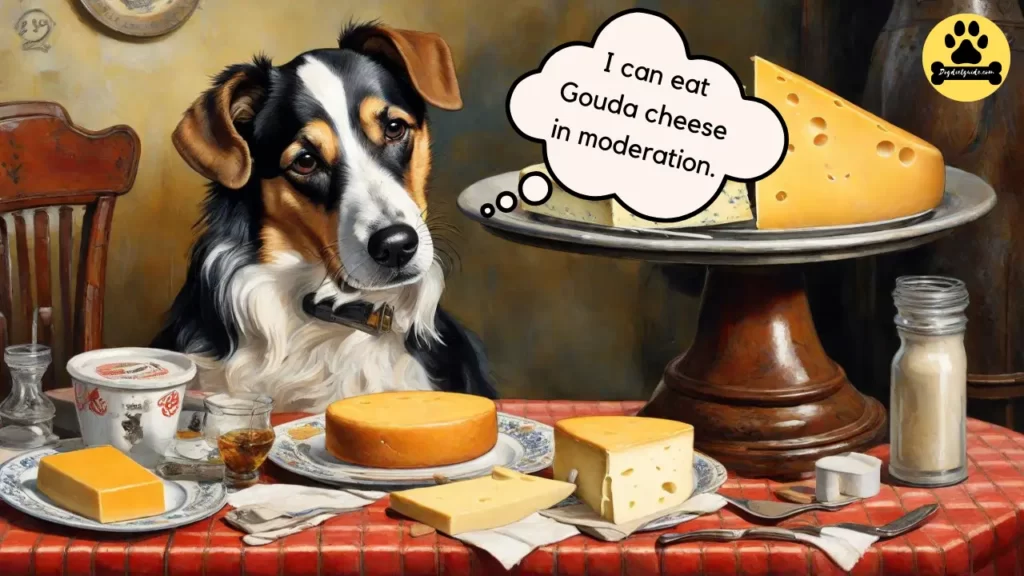We dog owners often enjoy sharing our favorite treats with our furry companions. However, not all human foods are safe for consumption when it comes to our canine friends. The rich and flavorful Gouda cheese is one such delight that often finds its way onto our cheese boards. As we contemplate whether to share a nibble with our four-legged pals, the question arises: Can dogs eat Gouda cheese?
Nutritional Analysis of Gouda Cheese for Dogs:
In moderation, Gouda cheese is a safe addition to a dog’s diet. Gouda is a good source of calcium and protein, but its high fat and lactose content may raise concerns. Lactose intolerance is common among dogs, making dairy products a potential source of discomfort.
The Gouda Cheese Appeal
Gouda, a semi-hard cheese originating from the Netherlands, boasts a distinctive flavor profile loved by many. Its creamy texture and mild taste make it a delectable treat for humans, but does it hold the same appeal for our canine companions?
Can Dogs Eat Gouda Cheese?
Yes, dogs can eat Gouda cheese in moderation occasionally. Gouda is a rich source of protein and an excellent provider of calcium and zinc, which can benefit your dog. However, remember that Gouda cheese also has some drawbacks for canines.
While calcium and protein are beneficial, the fat content in Gouda can be a double-edged sword, potentially leading to digestive issues and obesity in dogs.
Lactose intolerance is common among canines, making dairy products a potential source of discomfort. It’s important to monitor your dog for any adverse reactions and consult with your veterinarian if you have concerns about their diet.

Gouda Cheese Benefits For Dogs
- Is Gulda cheese safe for dogs? Gouda cheese, like other dairy products, contains protein essential for muscle development and overall health.
- Cheese is a good source of calcium, which is important for maintaining strong bones and teeth in dogs.
- Gouda cheese contains various vitamins, including vitamin A and B-complex vitamins, which contribute to overall health.
- Many dogs enjoy the taste and texture of cheese, making it a useful treat for training or as an occasional reward.
Gouda Cheese Health Risks For Dogs
- Some dogs are lactose intolerant, meaning they lack the enzyme to digest lactose, the sugar in milk, properly. This can lead to digestive upset, including diarrhea and stomach discomfort. Gouda cheese, like other dairy products, contains lactose.
- Cheese is often high in fat and calories, contributing to obesity and other health issues if given in excess. Moderation is key.
- Some cheeses, including Gouda, can be high in salt, which can be detrimental to a dog’s health if consumed in large quantities. Excessive salt intake may increase thirst, urination, and sodium ion poisoning.
- Each pup is unique, and individual dogs may react differently to certain foods. When introducing new treats, including cheese, it’s essential to monitor your dog for any signs of allergies or sensitivities.

Related Post: Can Dogs Eat Octopus?
Safe Serving Ideas
When serving Gouda cheese or any other cheese to canines, it’s important to do so in moderation and choose safe serving ideas. Here are some suggestions for safe ways to give your dog Gouda cheese:
- Small Cubes or Slices:
- Cut the Gouda cheese into small, bite-sized cubes or thin slices. This makes it easier for your dog to chew and reduces the risk of choking.
- Mix with Dog Food:
- Mix a small amount of finely grated Gouda cheese into your pup’s regular food. This can add flavor and make the meal more enticing.
- Homemade Dog Treats:
- Incorporate Gouda cheese into homemade dog treats. You can find recipes for dog-friendly treats that include cheese as an ingredient.
- Cheese Stuffed Toys:
- Use Gouda cheese as a stuffing for canine toys designed to hold treats. There are toys available that can be filled with food, providing mental stimulation and a tasty reward for your furry friend.
- Freeze Small Portions:
- Freeze small portions of Gouda cheese to create a cool and refreshing treat for your pooch, especially during warmer weather. Frozen cheese can be a crunchy and satisfying snack.
- Cheese Puzzle Games:
- Incorporate Gouda cheese into puzzle toys or games designed for canines. This engages their minds as they extract the cheese from the toy.
- Monitor Portions:
- Be mindful of the quantity you’re offering. Even though pups may enjoy cheese, it’s important to keep the serving size small to avoid excessive calorie intake, high-fat consumption, or digestive upset.
- Check for Additives:
- When selecting Gouda cheese, option for plain varieties without added herbs, spices, or seasonings. Some additives may not be suitable for dogs.

Related Post: Is Patchouli Safe For Dogs?
Symptoms of Lactose Intolerance in Dogs
Recognizing the signs of lactose intolerance is imperative for responsible pet ownership. Watch for symptoms like diarrhea, vomiting, and abdominal discomfort after your dog consumes dairy, including Gouda cheese.
Safe Alternatives to Gouda for Dogs
If the risks associated with Gouda give you pause, fear not, several dog-friendly alternatives provide similar nutritional benefits without the potential drawbacks. Explore options like plain, unsalted cottage cheese for dogs or canine-approved treats to satiate your dog’s palate.
Which Dogs Should Not Eat Cheese?
- Some canines lack the enzyme lactase needed to digest lactose in cheese, leading to digestive upset.
- Dogs with a history of pancreatitis or susceptibility to it should avoid high-fat cheeses.
- Dogs can have allergies or sensitivities to dairy and signs like itching or gastrointestinal issues may indicate a problem.
- Cheese is calorie-dense; moderation is crucial, especially for dogs prone to obesity or overweight.
- Dogs with specific health conditions (e.g., kidney disease) may require a specialized diet and cheese intake should be monitored accordingly.
Final Thoughts: Can Dogs Eat Gouda Cheese?
In the grand symphony of pet care, whether dogs can eat Gouda cheese requires a nuanced understanding. While the occasional nibble might not spell disaster, responsible pet ownership mandates awareness of potential risks and a commitment to moderation.
Your pup’s well-being is paramount, and by navigating the culinary landscape with care, you can strike a harmonious balance between tasty indulgences and a wholesome, healthy diet for your beloved furry friend.
” It is essential to emphasize that while we offer valuable insights, we do not intend to replace or undermine the importance of your veterinarian’s advice. The information presented on our site is purely for informational and educational purposes.”

I’m JK. A pet lover who has years of pet blogging experience. I thought it would be a great idea to share my experience with all dog owners so they can also keep their canine companions healthy and happy.






